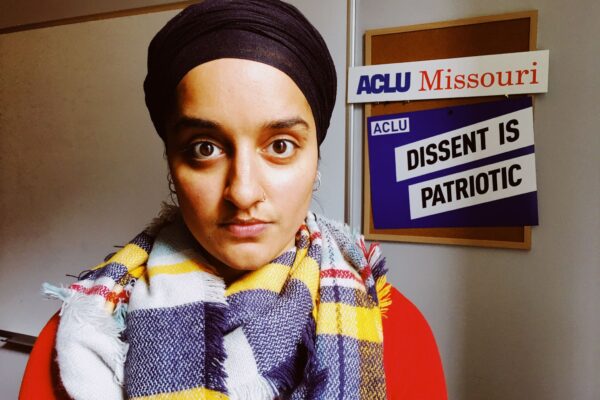She cradled her face as her eyes seared from the pepper spray. She writhed on the concrete ground in pain and shock. She was scared because she was unable to see. In this vulnerable moment, she felt gratitude toward the strangers who came to her aid with remedies to ease her stinging eyes and face on that hot autumn day in downtown St. Louis.
As these strangers soothed Maleeha Ahmad after the traumatic incident, her mind reeled to how those sworn to protect and serve had just hurt so many people.
When she sees a law enforcement officer now, the events of September 15, 2017, flash through Ahmad’s mind.
“It was such an emotional experience,” Ahmad said. “If I am still scared by a few negative interactions with law enforcement, what would it be like to have that constant experience your entire life?”
Ahmad is one of the plaintiffs in an ACLU of Missouri lawsuit against the city of St. Louis. The suit focuses on police misconduct against the public during protests following the not-guilty verdict of former police officer Jason Stockley, who killed Anthony Lamar Smith in 2010.
Officers unconstitutionally deployed chemical agents, like the pepper spray used on Ahmad, interfered with people taking video of police activity, and violated due process rights of the public.
“Being a person of color and a Muslim has helped me see the discrimination black people face every day,” Ahmad said.
While the decision to become a plaintiff for Ahmad was clear, it’s not easy for someone who doesn’t like the spotlight.
“I chose not to be silent because my silence means that there won’t be change,” Ahmad said. “I’ve often thought, ‘Why me? Why is my story important?’”
She finds an answer in her childhood: Growing up as the daughter of Pakistani immigrants outside Atlanta, Ga.
“As a Muslim and a Hijabi raised in the South, you hope that people speak up,” Ahmad said of the discrimination she’s experienced since 9/11. “It’s those outspoken people who keep your faith in humanity.”
For Ahmad, her involvement in the Black Lives Matter movement is an opportunity to express both her faith in humanity and in the Ahmadiyyat sect of Islam.
“As a Muslim, you’re raised to respond with acceptance, patience, forgiveness and being respectful to other cultures and other religions,” said Ahmad. “As a person of color, I recognize my place within the Black Lives Matters movement. I’m an ally.”
She urges people to look at the facts of the case and the judge’s ruling in granting the temporary injunction against the city, protecting the constitutional rights of the people.
Ahmad hopes that this lawsuit will catalyze change for both policy and people.
“Do you think Selma happened on the sidewalks? Police didn’t greet them with open arms,” Ahmad said. “We say we see all humans as equal. But we don’t. The work starts when we challenge our own biases. Now is the time.”

